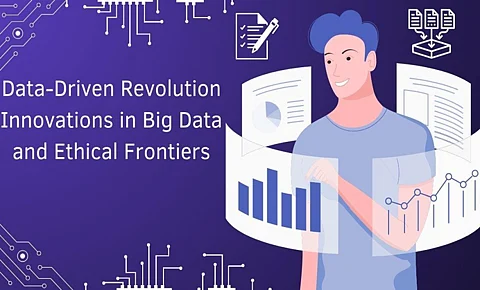

In a world increasingly shaped by digital innovation, Ankur Partap Kotwal, a noted expert in big data technologies, provides an incisive analysis of how big data innovations are transforming society. His recent work highlights cutting-edge advancements while addressing the critical balance between innovation and ethical responsibility.
This has spurred rapid acceleration in data collection infrastructure in the face of the exponential growth of the global datasphere — projected to reach 175 zettabytes by 2025. There is a wide variety of data collected, from distributed sensor networks that monitor smart cities to social media platforms that process multi-billion user interactions. These emerging technologies like IoT networks handle over 4.4 petabytes of machine-to-machine data daily, and they have great potential to transform fields like urban planning and industrial maintenance.
Distributed computing framework-enabled processing of petabytes of data at lightning speed supports these vast networks. At the same time, with sophisticated stream processing engines and real-time machine learning pipelines, organizations can now take raw data and make it actionable at speeds unimaginable previously.
Unprecedented precision and efficiency are transforming decision-making in numerous industries with the help of advanced analytics tools. With an accuracy rate as high as 92% (and increasing), businesses can use predictive modelling to accurately predict trends in the market, tighten their strategies, and cut down their working process. Today, the natural language processing (NLP) version of this in customer engagement comes in at 89% accuracy on multi-language sentiment analysis, allowing deeper insights into customer preferences and behaviour. At the same time, integration between deep learning and computer vision has transformed the efficiency of quality control in manufacturing. Hundreds of thousands of images per second, defects are identified with accuracy of 98% and more. This is driving cost reduction, operational excellence and strategic growth.
Handling the growing complexities of big data requires optimized infrastructure. Advances in load balancing, caching, and fault-tolerance mechanisms have made systems more efficient and reliable. For example, automated resource scaling now adjusts computing power within seconds, significantly reducing operational costs while maintaining near-perfect uptime.
Innovations in data compression and intelligent storage tiering have further enhanced cost efficiency, enabling organizations to manage large datasets without over-provisioning resources. These developments ensure scalability and reliability in a data-driven world.
With greater reliance on big data comes heightened risks, particularly in security. Ransomware attacks and distributed denial-of-service (DDoS) incidents increasingly target data infrastructures, necessitating robust encryption and authentication measures. Emerging Zero Trust frameworks have proven effective in mitigating breaches, reducing successful attack rates by over 70%.
Equally pressing are issues related to data quality. As organizations manage petabytes of distributed data, ensuring consistency and accuracy is vital. Modern tools address these challenges by automating schema validation and entity resolution, significantly improving data integrity while reducing operational overhead.
Modern technology is placing an increasing ethical emphasis on adopting big data systems, with new and exciting inventions such as differential privacy and homomorphic encryption to keep analytics secure and privacy-protected. Differential privacy empowers companies to learn from data without revealing individual data, making a big difference in cloistered industries such as healthcare and finance. Meanwhile, progress in fighting algorithmic bias is animating fairness in automated decision-making. Advanced bias detection frameworks are developing from processing large quantities of data to identifying and eliminating disparities and reducing discriminatory outcomes by as much as 83% or more in key areas — including hiring and lending. Put together, such developments promise a day when big data innovation cosies up to ethical responsibility.
With the data in a data-driven world dominating everything, organizations are rolling out robust data governance frameworks to make sure their data is growing sustainably. They tap into time-saving advanced technologies like automated compliance monitoring, dynamic access controls and efficient data lifecycle management to navigate the number of complexities in the rapidly changing regulatory landscapes. They consist of such ethical principles in the operation that promote trust and accountability. The coincidence of this alignment of innovation with societal values not only attenuates risks, but also promotes public confidence in technology to allow for progress that is sustainable, fair, and fulfilling. With the rise of these practices, organizations are laying the path to a responsible digital future.
In conclusion, Ankur Partap Kotwal’s examination of big data innovations highlights a future where progress is balanced with ethical responsibility. His insights emphasize that as these systems grow in complexity, the focus must remain on integrating innovation with accountability. This perspective ensures that technological advancements not only achieve technical milestones but also contribute meaningfully to societal well-being, fostering a future where innovation serves humanity's best interests.
